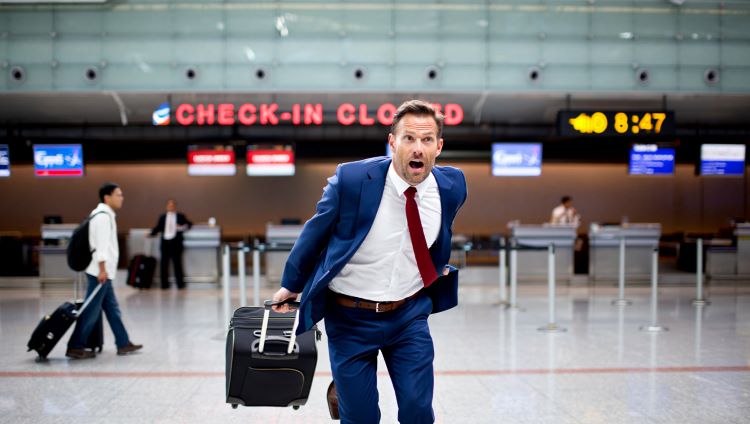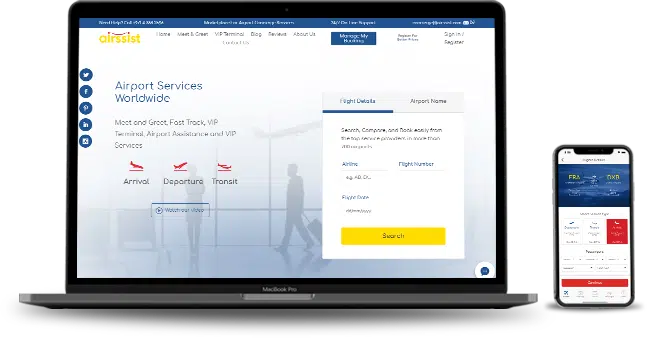Table of Contents
Business professionals have many things to think about when planning a work trip, whether they’re choosing the best business travel destinations or organizing a tight schedule. Ideally, the airport should be a minor part of the day. However, many professionals fall into the same routine errors while planning their trip, losing time and energy with each mistake, and throwing their schedule off. The worst part is that these business travel mistakes happen quietly. Ignoring updates, long security lines, poor time management, unorganized luggage, and weak overall planning all lead to a less-than-optimal travel experience.
This guide details the most common business travel mistakes made, the reasons behind them, and the simple habits that can prevent them. Every point is practical and relevant to the constantly changing nature of business travel today.
Quick Summary
Most airport problems for business travelers stem from a lack of preparation, weak time management, difficulty adapting to airport standards, and failure to use travel assistance apps. When these mistakes are corrected, the result is a more efficient, less stressful, and more confident travel experience.
1. Failing to Track Real-Time Flight Status Changes (That’s When Trouble Starts)
Travelers can sometimes be overly confident and rely only on email confirmations for flight updates. It is one of the most overlooked business travel mistakes because confirmation emails do not change, while airlines frequently update departure gates and times.
According to the U.S. Department of Transportation (DOT), a flight is only considered “on-time” if it operates within 15 minutes of its scheduled arrival. Even small updates matter; missing one alert can quickly put your trip off track.
This mistake can easily lead to a missed flight.
To avoid this, travelers should:
- Enable notifications from their airline travel app
- Check departure and arrival gates frequently
- Stay aware of boarding time to avoid last-minute rushes
This simple habit can completely transform the travel experience.
2. Getting to Security Later Than You Should
It is a classic business travel planning mistake. Many travelers believe they can arrive at security just before boarding and still catch their flight.
Security is unpredictable, and lines take longer. Business travelers who follow best practices arrive at least 30 minutes early and keep their documents organized to get through quickly. Being early for airport security is always safer than being late.
3. The Wrong Way of Packing Electronics
Business travelers often carry multiple devices, including laptops, tablets, chargers, batteries, and accessories. When these items are buried at the bottom of a bag, security becomes slow and messy. But don’t worry! It’s one of the easily avoidable business travel mistakes.
Smart travelers avoid delays simply by not packing electronics deep inside their bags.
The smarter packing rule is: keep electronics at the top, use a single dedicated tech pouch, and avoid tangled cables. This habit saves time at every checkpoint.
4. Not Using a VPN
Travelers often skip airport Wi-Fi and connect to whatever network appears available. Many of these networks are unsafe or lack privacy. Business travelers sometimes open confidential documents or log into company systems over unsecured networks.
It is a major corporate oversight.
Always use a VPN. Download documents beforehand. Avoid accessing sensitive accounts on open networks. Digital safety must be part of business trip planning.
5. Airport Lounge Neglect
Many believe airport lounges are only for first-class travelers. That is not true. Lounges provide amenities business travelers need, including reliable Wi-Fi, quiet work areas, charging stations, and comfortable seating.
Airport services make this even easier by allowing travelers to book business lounge access regardless of airline or ticket class. Many professionals prefer airssist because it simplifies the entire lounge experience, such as quick booking, wide global coverage, and consistent service, making it far more convenient for busy business travelers.
So it’s fair to say that skipping lounges is one of the most significant business travel mistakes. Always remember that the environment you work in matters a lot.
6. Underestimating Terminal Distances
Assuming gates and terminals are close to each other is one of those sneaky business trip mistakes that catches travelers off guard. Knowing your terminal layout prevents these issues.
- Don’t forget to check airport maps
- Look for inter-terminal shuttle trains
- Plan enough walking time
7. Getting Caught Off Guard at Security Screening (And Slowing Yourself Down!)
Not all airports follow the same security procedures. Some require laptops to be removed, others allow them in the bag. Some allow liquids, others do not. Forgetting the rules increases stress and slows down everyone behind you.
Pre-check what you can bring on board to save time and avoid repacking at the conveyor belt.
8. Poor Layover Planning
Poor layover planning creates panic during short connections and exhaustion during long ones. It’s one of those business trip planning mistakes to avoid if you want a stress-free day. To achieve it, a balance is required. Also, WTTC data shows international visitor spending grew 11.6% in 2024, reaching US$1.9 trillion, underscoring how rapidly global travel activity is rising and why smart planning matters more than ever.
For short layovers:
- Walk quickly to the next gate
- Avoid unnecessary stops
For long layovers:
- Rest
- Eat before boarding
- Use a lounge for productive work.
Layover planning is a key part of planning a business trip itinerary.
9. Going Without Backup Documents
Traveling without backup documents is risky. Traveling light is good, but certain issues can be avoided with backups. Phones can die, screens can break, apps can freeze, or scanners may not work.
Physical documents are quick to access during boarding. Bring:
- Printed boarding pass
- Hotel confirmations
- Meeting letters
- Passport copies
This small list provides huge benefits.
10. Overpacking
Overpacking is one of the most common problems business travelers face. Heavy luggage slows you down at check-in, security, and boarding.
Smart business travelers pack:
- Two main outfits
- One pair of comfortable shoes
- Light jackets
- Minimal accessories
Overpacking is easy to fix and makes travel significantly smoother.
11. Forgetting About Priority Services Offered at the Airport
Many executives try to handle everything on their own, even in complex airport environments. Long lines, heavy bags, spread-out terminals, and constant time pressure make this difficult.
If you’ve reached this point, you may be asking who can reliably provide these services. The safest choice is to go with genuine, top-rated, ISO-compliant companies like airssist. Their Meet & Greet, escort support, fast-track access, and porter services save time and streamline your journey. With dependable support, you can focus entirely on your business rather than airport logistics.
12. Not Preparing for Immigration Requirements (Country-Entry Rules)
International travel often requires paperwork. Digital visas, QR codes, and online approvals are convenient, but immigration officers may still request printed copies or return tickets.
Always carry visa printouts, documents outlining entry requirements, and return flight confirmations.
A little preparation goes a long way.
13. Not Using Airport Navigation Apps
Most major airports now offer navigation apps. They can help you:
- Find the shortest route to your gate
- Check security wait times.
- Locate lounges
- Find restaurants
Using these apps saves time and prevents confusion.
14. Underestimating Travel Insurance
Many business travelers assume their company covers all risks. It is a misconception. Unexpected costs such as delays, lost luggage, damaged devices, or medical emergencies can arise.
Travel insurance covers many of these risks and protects business assets. It also provides peace of mind.
15. Not Booking Airport Transportation Early
Relying on taxis upon arrival at a busy airport is risky. Taxis may be limited during peak hours, causing delays. Pre-book your transportation.
For efficiency, choose a chauffeur service. Time is a business traveler’s most valuable resource; plan to protect it.
16. Arriving at the Airport with a Low Battery
When your phone dies, you lose access to boarding passes, emails, calls, documents, and maps.
Always arrive with your phone fully charged. Bring a portable battery. Productivity starts with power.
17. Eating Heavy Meals Before Flights
Travelers often eat heavy meals before boarding due to schedule pressure, which can cause discomfort. It also reduces focus and productivity.
Eat light meals and stay hydrated. Good nutrition helps keep your energy stable during meetings after landing.
18. Failing to Check Airport-Specific Policies Prior to Traveling
Each airport has its own operational rules, separate from security screening, such as terminal access restrictions, shuttle requirements between concourses, or ID checks at certain entry points.
Ignoring these details can cause last-minute confusion or delays. Checking airport-specific policies ahead of time prevents these avoidable issues.
19. Scheduling Meetings Too Soon After Landing
Many travelers schedule meetings immediately after landing. It causes stress and reduces performance.
Jet lag affects memory, decision-making, and alertness. Give yourself time to recover. Even one hour makes a meaningful difference.
20. Failing to Prepare for Delayed Flights
Delays happen frequently. Many travelers have no strategy for handling them.
Bring:
- Noise-canceling headphones
- Work files offline
- Snacks
- A book or offline entertainment
A delay should not destroy your productivity.
Frequently Asked Questions
What are the most common business travel mistakes at the airport?
Some of the most common business travel mistakes at the airport are ignoring flight notifications, arriving at security without having everything ready, not having electronics organized, and simply not taking into consideration how long it takes to walk from one gate to another or from one terminal to another. These small miscalculations can add up and cause delays, and possibly a lost flight.
What mistakes should business professionals avoid when planning a trip?
Some mistakes business professionals should avoid are planning a trip with very small layovers, not having a printed copy of their itinerary, not obtaining travel insurance, and not having the ability to access lounges or additional services such as Meet and Greet or priority assistance. These are planning mistakes that can greatly increase the amount of time and effort it takes to travel.
How can business travelers reduce stress?
Some of the ways business travelers can reduce stress include spending time at airport lounges, having spare time at security and boarding, keeping their documents and electronics organized, and tracking their flight using real-time updates that are available in apps. These small habits are what smooth out the travel day.
What should business travelers do before arriving at the airport?
Prior to arriving at the airport, business travelers ought to charge every important device, organize and arrange their travel documents, and perform a final packing check to guarantee that everything necessary is prepared and readily available. This preparedness allows for the avoidance of issues that may arise at the last minute.
Why do business travelers miss flights?
There are a multitude of reasons business travelers miss flights. Among the more common ones are unforeseen gate changes, lengthy security lines, terminal movement being sluggish, or arriving at the airport a bit too close to their flight time.
With good time management and flight tracking in real time, most of these scenarios can be avoided.
No More “Oops” Moments; Time to Travel Smarter!
Business travel is simpler when you pay attention to details. With structure, organization, dependable airport resources, and a few simple business travel tips, you can avoid almost every business travel mistake people make every day, and it doesn’t become a tedious part of your travel routine. Airports become less stressful.
Take time before your journey to prepare. With small, careless decisions, you make the travel experience worse.
I will leave you with a quote that fits perfectly with smart business travel planning:
“By failing to prepare, you are preparing to fail.” — Benjamin Franklin
Here’s to smarter travel, calmer airports, and business trips that actually work for you, not against you. And with airssist’s business solutions, that’s entirely possible.
Sources
U.S. Department of Transportation (DOT). Air Travel Consumer Reports.
https://www.transportation.gov/individuals/aviation-consumer-protection/air-travel-consumer-reports
World Travel & Tourism Council (WTTC). 2024 Economic Impact Report.
https://www.forumbusinesstravel.com/en/news/79-of-business-travelers-experienced-problems-while-traveling-in-2024/
Reader’s Digest. Airport Security Mistakes Travelers Commonly Make.
https://www.rd.com/article/airport-security-mistakes/
Forbes – Laura Begley Bloom. The 20 Worst Mistakes You Can Make on a Business Trip.
https://www.forbes.com/sites/laurabegleybloom/2016/09/21/the-20-worst-mistakes-you-can-make-on-a-business-trip/
Note: Please note that the information on this page is generic & subject to change due to fluctuations in airport services. Kindly confirm service availability with our team, as offerings may vary daily.
 French | Français
French | Français Spanish | Espana
Spanish | Espana German | Deutch
German | Deutch Arabic | العربية
Arabic | العربية Chinese | 中文(简体)
Chinese | 中文(简体) Japanese | 日本語
Japanese | 日本語



